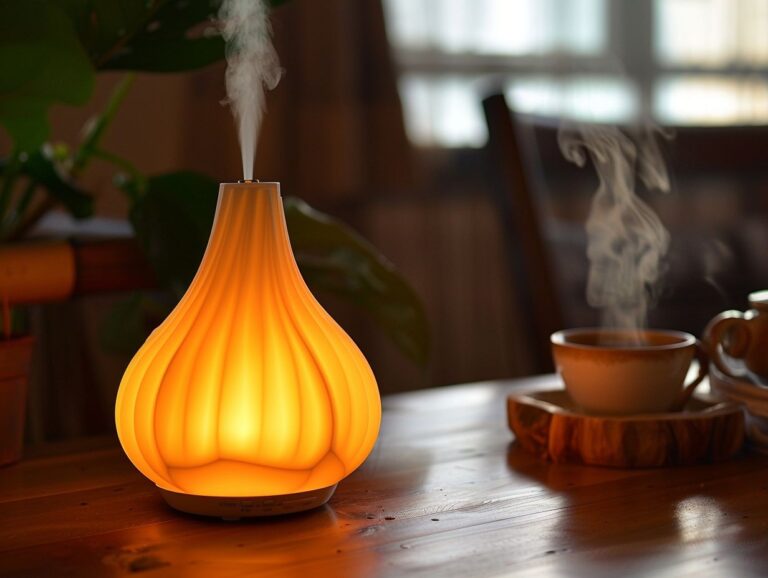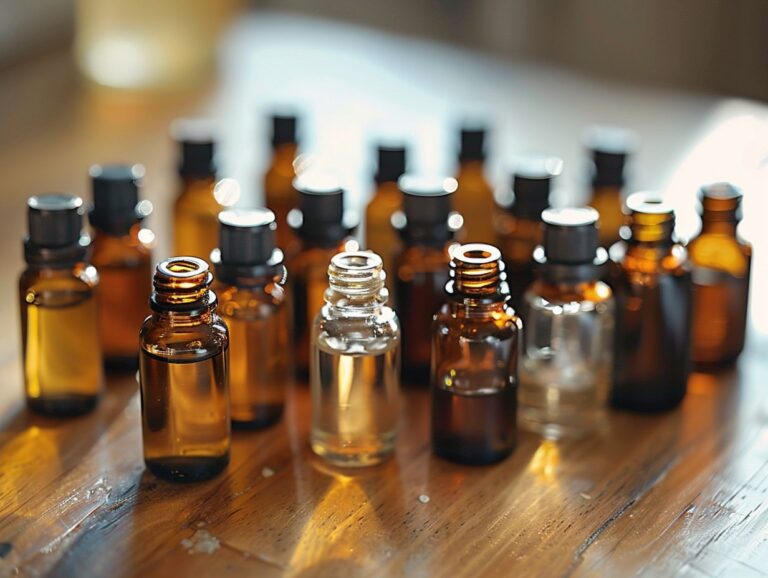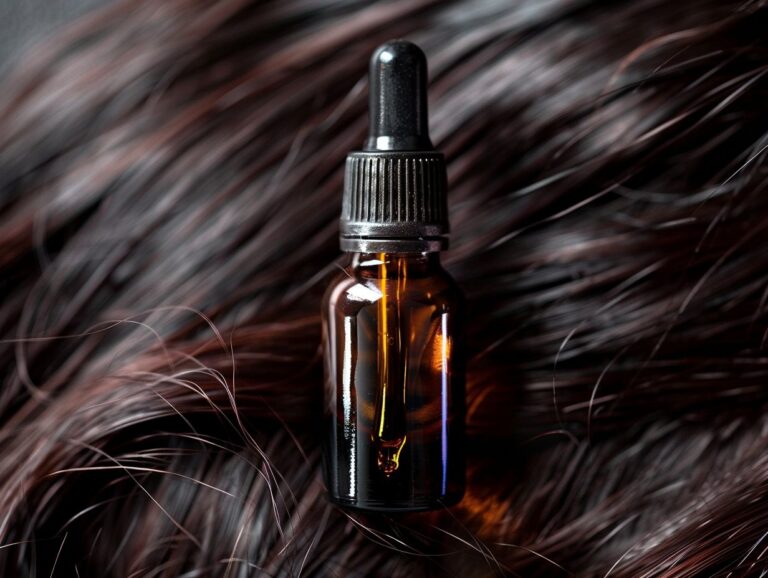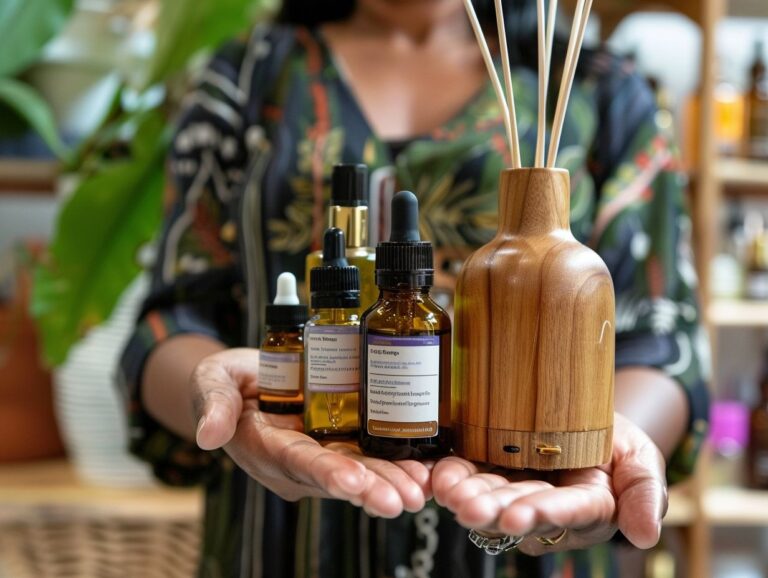Can You Become Desensitized to Essential Oils
Have you ever wondered about the benefits of essential oils and how they can be used to improve your well-being?
From reducing stress and anxiety to boosting your immune system, essential oils have a range of health benefits.
Learn about sensitization to essential oils, its signs and causes, and how to prevent and potentially reverse this issue in this article.
Let’s dive in and explore the world of essential oils!
Key Takeaways:
What Are Essential Oils?
Essential oils are natural aromatic compounds extracted from plant material such as flowers, leaves, stems, and other parts. They are highly concentrated and contain the essence of the plant they are derived from.
In terms of extracting essential oils, there are various methods used depending on the plant source. Distillation is one common technique, where steam is passed through the plant material to capture the volatile oils. Another method is cold pressing, typically used for citrus fruits, where the oils are mechanically squeezed out.
Essential oils boast a wide range of properties; they can be anti-inflammatory, antibacterial, calming, or invigorating, depending on the plant and compounds present. These versatile oils find extensive use in aromatherapy for their therapeutic effects on both the mind and body. In skincare, essential oils are valued for their nourishing, rejuvenating, and soothing qualities, catering to different skin types and concerns.
How Are Essential Oils Used?
Essential oils are commonly used in aromatherapy, a practice involving the use of aromatic essential oils for holistic healing and wellbeing. Aromatherapists often blend and apply these oils during massages or through inhalation methods.
Applying essential oils can be done in various ways, such as through topical application, where the oil is diluted with a carrier oil and directly applied to the skin. Inhalation methods include diffusing the oils in the air or inhaling them by adding a few drops to a bowl of hot water. Aromatherapists use their expertise to carefully select and blend oils based on the individual’s needs, considering factors like the client’s health condition and emotional state to create customized blends that are most beneficial.
What Are The Benefits Of Essential Oils?
Essential oils offer a wide range of benefits, from reducing stress and anxiety to relieving pain and inflammation. Their natural properties make them popular for improving sleep quality and boosting the immune system.
One of the key advantages of essential oils is their ability to promote relaxation and ease stress, creating a calming environment. Lavender oil , for example, is renowned for its soothing effects on the mind and body, helping individuals unwind after a long day. Essential oils like eucalyptus and peppermint can be used for pain management due to their analgesic properties, providing relief from headaches, muscle aches, and joint discomfort.
Certain essential oils, such as chamomile or bergamot , are known for their sleep-enhancing qualities. These oils can be diffused before bedtime to create a tranquil atmosphere and promote restful sleep. Furthermore, tea tree and lemon essential oils possess antimicrobial properties that can help strengthen the immune system, warding off common illnesses and supporting overall health.
Reduces Stress And Anxiety
By inhaling or topically applying certain essential oils, individuals may experience a reduction in stress and anxiety levels. The calming aromas of these oils can help promote relaxation and emotional well-being.
One essential oil known for its stress-relieving properties is lavender oil. Lavender oil works by interacting with the limbic system in the brain, which is responsible for emotions and memories, helping to calm the mind and reduce feelings of stress.
Another popular choice is chamomile oil, which contains compounds that can aid in relaxation by promoting the release of neurotransmitters like serotonin. This helps to create a sense of calm and alleviate anxiety.
Citrus oils such as bergamot or orange oil are known for their uplifting and mood-boosting effects, making them useful in reducing stress and promoting a positive mindset.
Relieves Pain And Inflammation
Certain essential oils have analgesic and anti-inflammatory properties that can help alleviate pain and reduce inflammation when applied topically or through aromatherapy. These oils offer a natural alternative for pain relief.
One such powerful essential oil is Peppermint. Known for its cooling sensation, Peppermint oil can help numb pain receptors and soothe sore muscles. Additionally, Lavender oil is revered for its calming and anti-inflammatory effects, making it beneficial for managing both physical and emotional pain.
- Another notable oil is Eucalyptus, which contains compounds that aid in reducing swelling and improving circulation.
- Frankincense oil is valued for its ability to promote relaxation and ease muscle tension, making it a preferred choice for addressing chronic pain.
These essential oils, when used correctly, can complement traditional pain management approaches by providing natural relief without harsh side effects.
Improves Sleep Quality
Aromatherapy with certain essential oils like lavender or chamomile can promote relaxation and improve sleep quality. The calming scents of these oils can create a soothing bedtime environment.
Oils such as cedarwood and ylang ylang are renowned for their sedative properties, aiding in combating sleep disorders like insomnia and restless sleep. These oils work by lowering stress levels and easing tension in the mind and body, paving the way for a restful night’s sleep.
Boosts Immune System

Among the most well-known essential oils for their immune-boosting qualities are tea tree oil, eucalyptus oil, and lavender oil. Tea tree oil is renowned for its antimicrobial properties, helping to combat infections and bolster the immune response.
Eucalyptus oil is a powerful decongestant, promoting clear breathing which is essential for a robust immune system. Lavender oil is not just soothing but also possesses antiviral and antibacterial properties, making it versatile in immune support.
Incorporating these essential oils into your daily routine through diffusing, topical application, or even inhalation can contribute to a stronger and more resilient immune system.
Can You Become Desensitized To Essential Oils?
While essential oils have numerous benefits, repeated exposure can lead to sensitization, where the body’s immune system develops an allergic reaction to certain oils. Sensitization to essential oils is a growing concern in the aromatherapy community.
This process occurs when the immune system recognizes specific components in the essential oils as harmful invaders, triggering a defensive response. Over time, with continued exposure, the body’s immune system becomes increasingly sensitive to these compounds, leading to the development of allergic reactions. It is essential to understand that sensitization is not immediate; it often happens gradually, making it crucial to monitor any signs of adverse reactions when using essential oils. Individuals with existing allergies or compromised immune systems may be more susceptible to sensitization, underscoring the importance of caution and moderation when incorporating essential oils into daily routines.
What Is Sensitization To Essential Oils?
Sensitization to essential oils refers to the process where the immune system becomes hypersensitive to specific components within the oils, leading to allergic contact dermatitis upon subsequent exposure.
When a person is exposed to essential oils, the immune system recognizes certain molecules within the oils as threats. This recognition triggers an immune response aimed at eliminating the perceived threat.
This reaction involves the activation of specialized immune cells called T-cells, which play a crucial role in orchestrating the body’s defense mechanisms.
Over time, repeated exposure to these specific molecules can lead to the development of allergic contact dermatitis, a skin condition characterized by redness, itching, and inflammation at the site of contact.
What Are The Signs Of Sensitization?
Signs of sensitization to essential oils can manifest as skin reactions such as redness, itching, swelling, or hives. These allergic responses indicate that the immune system has developed a hypersensitivity to certain oil components.
Dr. Smith, an expert in dermatology, explains that skin sensitization occurs when repeated exposure to a particular essential oil triggers an allergic response. The body’s immune system recognizes these oil components as harmful invaders, leading to the release of histamines that cause inflammation. This inflammatory process results in the characteristic symptoms of sensitization, like blistering, peeling, or even eczema-like rashes.
What Causes Sensitization To Essential Oils?
Sensitization to essential oils can be caused by various factors, including overuse of certain oils, exposure to low-quality oils with impurities, and pre-existing allergic reactions that trigger immune responses.
It is essential to consider the purity and source of the essential oils, as poor quality or adulterated oils could contain synthetic substances that may elicit allergic responses in sensitive individuals. The frequency and intensity of oil usage play a crucial role; excessive application or prolonged exposure can overwhelm the body’s tolerance level, leading to sensitization.
Individual variation in immune system reactivity is another critical aspect to consider. Each person’s genetic makeup and past exposure to allergens can influence how the body responds to essential oils, making some individuals more prone to developing sensitivities.
Overuse Of Essential Oils
Excessive or prolonged use of certain essential oils without proper dilution can increase the risk of sensitization. Overuse exposes the skin to concentrated oil components, leading to potential allergic reactions.
This can be particularly concerning for individuals with pre-existing skin conditions like eczema, as their skin barrier is already compromised, making them more susceptible to adverse reactions from undiluted essential oils. It’s vital to follow recommended dilution ratios and guidelines provided by reputable sources to minimize the risk of sensitization.
Alternating between different essential oils and giving the skin breaks in between uses can help prevent cumulative exposure and decrease the likelihood of developing sensitivities over time.
Exposure To Low-quality Oils
Using low-quality essential oils that may contain impurities or synthetic additives can heighten the risk of sensitization. It is crucial to source oils from reputable suppliers known for their quality and purity standards.
Reputable suppliers often adhere to strict sourcing and manufacturing practices, ensuring that their oils are pure and unadulterated. When selecting essential oils, look for suppliers that provide detailed information on the sourcing locations, extraction methods, and quality testing procedures.
Quality assurance measures such as GC/MS testing can help verify the authenticity of the oils and identify any potential contaminants. By choosing oils from trustworthy suppliers, you can minimize the risk of adverse reactions and enjoy the full therapeutic benefits of pure essential oils.
Allergic Reactions

It is crucial to understand the relationship between allergic reactions and essential oils to ensure safe and effective usage. Allergy awareness is key in preventing adverse responses, as even natural substances like essential oils can trigger sensitivities. Monitoring for signs of an allergy, such as redness, itching, or difficulty breathing, is vital when incorporating new oils into your routine. If you experience any concerning symptoms, seek medical advice promptly to address potential allergic reactions and receive appropriate treatment.
How To Prevent Sensitization To Essential Oils?
Preventing sensitization to essential oils involves proper dilution before use to minimize skin exposure and potential allergic reactions. Diluting oils with carrier oils or water can reduce the risk of sensitization.
When diluting essential oils, it’s essential to follow recommended dilution guidelines to ensure safety and efficacy. A common ratio for dilution is 2-3% essential oil to carrier oil. This means adding 12-18 drops of essential oil per ounce of carrier oil.
It’s also crucial to perform a
- patch test
before using any diluted oils on larger skin areas, especially if you have sensitive skin. This involves applying a small amount of the diluted oil mixture on a small patch of skin and monitoring for any adverse reactions.
Dilute Essential Oils Properly
Properly diluting essential oils with carrier oils or other suitable mediums is essential for safe usage and to prevent skin sensitization. Dilution ratios should be followed to minimize adverse skin reactions.
Essential oils are highly concentrated extracts from plants and can cause skin irritation or allergic reactions if used undiluted. Choosing the right carrier oil is crucial for effective dilution. Jojoba oil, coconut oil, and olive oil are popular choices due to their low scent intensity and good absorption properties.
For general use, a safe dilution ratio is around 2-3% essential oil to carrier oil. This translates to roughly 10-15 drops of essential oil per ounce of carrier oil. For sensitive areas like the face or children, it’s advisable to use an even lower dilution ratio of 0.5-1%.
Use High-quality Oils
Opting for high-quality essential oils sourced from reputable suppliers can reduce the risk of sensitization due to impurities or synthetic additives. Quality oils undergo strict testing and are free from contaminants.
In terms of essential oils, authenticity and supplier reliability play a crucial role in ensuring the purity and efficacy of the product. By choosing oils from trusted sources, consumers can have peace of mind knowing that they are using a product that is safe and authentic.
Trusted suppliers often provide detailed information about the sourcing and production processes, offering transparency that aids in building trust with customers. Reputable suppliers adhere to industry standards and guidelines, promoting the ethical and sustainable production of essential oils.
Perform Patch Tests
Conducting patch tests before applying essential oils to larger skin areas can help identify potential allergic reactions or skin sensitivities. Patch testing involves applying a diluted oil to a small skin patch and monitoring for adverse responses.
Early detection of skin sensitivities through patch testing is crucial in preventing uncomfortable and sometimes severe allergic reactions. It’s recommended to select a small area of skin, preferably on the forearm or inside of the elbow, to apply the diluted essential oil. The patch should be left undisturbed for 24 hours, then checked for any redness, itching, swelling, or other signs of irritation. In case of any negative reactions, the oil should not be used further, and medical advice must be sought.
Rotate Oils
Regularly rotating the use of different essential oils can help prevent sensitization by reducing prolonged exposure to specific oil components. Rotation allows the skin to rest and minimizes the risk of developing allergies.
By introducing a variety of essential oils into your aromatherapy routines, you can benefit from a diverse range of therapeutic properties. Each essential oil has its unique composition and benefits, catering to different skin needs and health concerns.
Creating an oil rotation schedule can be a great way to ensure that you are not overexposing your skin to specific compounds over an extended period.
Furthermore, rotating essential oils can also prevent olfactory fatigue, where the sense of smell becomes less sensitive to the aroma of a particular oil with prolonged use. This helps to enhance the overall effectiveness of aromatherapy practices.
Can You Reverse Sensitization To Essential Oils?
If sensitization to essential oils occurs, it is essential to discontinue the use of the offending oil and seek medical advice to manage allergic reactions. Desensitization processes involve avoiding triggers and using alternative oils.
Stopping exposure to the allergen is crucial in preventing further sensitization and minimizing the risk of severe allergic responses. Seeking professional help from an allergist or dermatologist can assist in identifying specific triggers and guiding the desensitization process.
Exploring alternative oils for aromatherapy is a proactive approach to continue enjoying the benefits of essential oils without triggering adverse reactions. Discussing potential alternatives with a healthcare provider can help in finding suitable options that are less likely to cause sensitization.
Stop Using The Oil

Identifying the trigger oil can be challenging but pays off in the long run. Look out for common culprits like lavender, tea tree, or citrus oils.
Keeping a detailed record of reactions can help pinpoint the exact oil causing the issue. Once the trigger oil is identified, it’s imperative to steer clear of products containing it. Avoiding contact with the sensitizing oil is paramount in preventing flare-ups and minimizing the risk of severe allergic reactions. Incorporating healthier alternatives and focusing on skin barrier repair can aid in the healing process.
Seek Medical Help
In cases of severe allergic reactions or persistent sensitization symptoms, seeking medical assistance is crucial for proper diagnosis and treatment. Medical professionals can provide guidance on managing allergic responses to essential oils.
Consulting healthcare professionals ensures that the symptoms are accurately diagnosed, enabling the implementation of appropriate treatment plans tailored to individual needs. Allergists and dermatologists specialize in identifying allergic reactions and sensitization to substances like essential oils, offering insights into potential triggers and preventive measures. They may recommend allergy testing, skin patch tests, and targeted therapies to mitigate symptoms and prevent future occurrences. Seeking medical advice helps in differentiating between true allergies and skin irritations, ensuring the application of the right interventions for optimal health outcomes.
Try Different Oils
Exploring alternative essential oils that do not trigger allergic reactions can provide options for aromatherapy enthusiasts. Trying different oils allows individuals to enjoy the benefits of aromatherapy without the risk of sensitization.
When looking for allergy-free options, consider soothing oils like lavender or chamomile, which are gentle on the skin and well-tolerated by most individuals. For those seeking energizing scents, citrus oils such as lemon or orange can offer a refreshing alternative without causing sensitivities. Additionally, diversifying the essential oils used in aromatherapy can bring about a range of therapeutic effects, from relaxation to invigoration.
By incorporating a variety of oils into your practice, you can tailor your aromatic experience to suit your mood and needs. This versatility in essential oils not only caters to personal preferences but also helps in reaping the diverse benefits that different oils offer. Whether you are looking for calming, grounding, or uplifting effects, the world of essential oils provides a vast array of options to explore.
Frequently Asked Questions
Can You Become Desensitized to Essential Oils?
Yes, it is possible to become desensitized to essential oils over time. This can happen if you regularly use the same oil without taking breaks or if you use high concentrations of oils for extended periods of time.
What are the symptoms of becoming desensitized to essential oils?
The symptoms may vary, but some common signs of desensitization include a decrease in the desired effects of the oil, a lack of response to the oil’s aroma, and skin irritation or sensitivity when using the oil.
How can I prevent becoming desensitized to essential oils?
To avoid becoming desensitized to essential oils, it is important to use them in moderation and take breaks from using the same oil. It is also recommended to dilute the oils and rotate between different scents to prevent overexposure to one specific oil.
Are some people more prone to becoming desensitized to essential oils?
Yes, some individuals may be more sensitive to essential oils and may become desensitized more quickly than others. It is important for everyone to use caution and listen to their body’s response when using essential oils.
Is it possible to reverse desensitization to essential oils?
In most cases, yes, it is possible to reverse desensitization to essential oils. By taking breaks from using the oil and rotating between different scents, the body can reset and regain sensitivity to the oils.
Can desensitization to essential oils be harmful?
While it is not harmful in the sense of causing severe health issues, desensitization to essential oils can be frustrating and may limit the desired benefits of using the oils. It is important to use caution and moderation when using essential oils to avoid desensitization.







